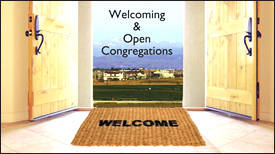By Alf McCreary
THE Church of Ireland has underlined its commitment to marriage as being between a man and a woman following its major weekend conference on human sexuality.
A joint statement from the Primate Archbishop Alan Harper and the Archbishop of Dublin Dr Michael Jackson stressed that “the church’s position on marriage as being the union of one man and one woman remains constant”.
Around 450 members of the Church of Ireland’s 600-strong General Synod met in the Slieve Russell Hotel in Co Cavan to discuss human sexuality “in the context of Christian belief”.
Members heard a wide range of views on same-sex relationships, described by the archbishops as “a substantial conversation reflecting strongly held convictions, characterised by clarity of expression but without judgmentalism”.
The special conference was called following a controversy which arose last year in the wake of the revelation that the Dean of Leighlin, the Very Rev Tom Gordon, had entered into a civil partnership with his long-time male partner.
This led to bitter exchanges between the liberal and conservative wings in the church.
The bishops held a two-day retreat last October, and later announced last weekend’s conference.
The two archbishops claimed that the conference had taken place “in a climate of helpful dialogue” but the pro-gay lobby group Changing Attitude Ireland continued to complain about the lack of gay speakers in the formal sessions.
The group’s secretary Canon Charles Kenny said: “While I welcome the special conference to discuss homosexuality, I am concerned at the insufficient contribution by gay and lesbian people.
“Over two days only one 45-minute session was allocated to gay speakers.”
Gerry Lynch, a gay member of the church, said: “Once again the leadership has made sure that my voice has been silenced at an event aimed at discussing my position in the church.”
A Church of Ireland spokesman said that Changing Attitude Ireland had been invited to nominate a spokesperson and that General Synod members had not been invited to the conference “on the basis of their sexuality”.
Members at the conference said that it had been a worthwhile exercise in hearing other points of view, but many doubted if it would make significant numbers on either side of the debate change their mind.
No decisions were made at the weekend, but some members underlined the need for the church to put forward a formal resolution for discussion at the General Synod meeting in May.


